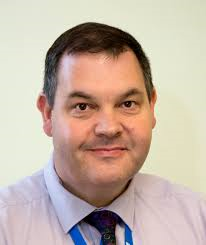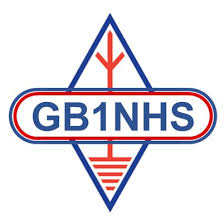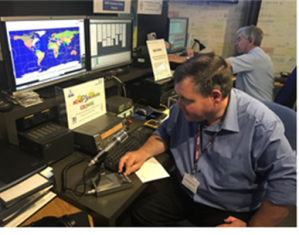
Paul Devlin (improvement manager) from the emergency care intensive support team (ECIST) discusses how the NHS’s first amateur radio station is being used to promote initiatives that improve health and wellbeing. ECIST would like to thank Paul for allowing us to share his article which first appeared in the emergency service times. Follow Paul on twitter: @DevlinPJ and the radio station @GB1NHS
Amateur, also known as HAM, radio is both a hobby and a public service. Its aim is to support the advancement of radio communications as well as provide emergency communications in disaster management situations.
Specially licensed radio operators have access to restricted radio frequencies and use a range of equipment to transmit across the global communications platform. This can range from people in the same town talking to each other through to the use of satellites and communications with the International Space Station.
Emergency communications role
The term amateur is used to differentiate it from commercial enterprise. It is interesting to note, however, that the amateur radio platform is possibly the most resilient civilian form of communications available internationally. This is because it does not rely on traditional mobile phone or internet technology, or even main power sources, to operate. It is for this reason that the United Nations, using International Treaties, protect the amateur radio spectrum and recognise its role in emergency communications.
Ofcom Spectrum Licensing issued the NHS with a government level radio call sign GB1NHS (Great Britain one National Health Service) in May 2018. GB1NHS is operated by NHS Improvement’s Emergency Care Intensive Support Team (ECIST). 
The NHS amateur radio station was founded by Paul Devlin and was initially formed to increase the focus and boost the social movement for a life changing initiative called End Pyjama Paralysis, a global initiative founded by Professor Brian Dolan aimed at preventing the physical deconditioning of patients who are in hospital.
Amateur radio operators and societies all over the world will link up with GB1NHS once again this year to help improve the lives of millions of people. They will be promoting the #EndPJparalysis global challenge initiative from 10-12 July 2019.
Amateur radio may feel like a bit of a closely guarded secret given that most people will not be aware of it, however this is not the case. The Radio Society of Great Britain has been working to promote and develop the concept since 1913. The society is recognised as one of the most proactive radio organisations internationally. Since the launch of GB1NHS, the NHS has used amateur radio as the means to reach communities and health services globally. This has been to promote, at scale, initiatives that improve health and wellbeing.
Reaching communities
The NHS is delighted with the way that amateur radio has significantly enhanced its ability to reach communities all over the world. Based on this success the NHS will take part in the following special radio events in 2019:
1 May: SOS Radio Week
12 May: International Nurses Day
29 June: Armed Forces Day
10-12 July: EndPJparalysis global summit
9 September: Emergency Services Day and International Air Ambulance Week
18-19 September: Community First Responders
10 October: World Mental Health Day
GB1CFR Community First Responder Radio Special Event Station
Many countries hold annual special radio events to promote the amazing work of community first responders. The first UK based radio event will take place at The Emergency Services Show 2019, at the NEC in Birmingham, from 18-19 September. Leigh Westwood and Nicki Pointer from Crowborough Community First Responders scheme will launch the event with a special greetings message.
NHS Hospital Amateur Radio Network
Over recent months the NHS team responsible for GB1NHS has been busy building relationships with the radio amateurs’ emergency network, RAYNET UK, and emergency preparedness professionals internationally.
Tim Pettis, Senior Emergency Preparedness Officer from Portsmouth and Southampton City Council, is one such person. Tim is incredibly passionate about the need to maintain resilient communications at NHS hospital sites. It was through discussions with people like Tim and RAYNET UK that an old idea has come forward as being more relevant than ever.
The first article by GB1NHS – Emergency Services Times (EST) December 2018, page 28 – highlighted the vulnerability of traditional communications systems and the significant resilience of the amateur radio network. Many hospitals internationally have amateur radio stations located on site to address this situation. Thanks to Tim’s idea, GB1NHS will work with a small number of hospitals with major trauma centres. The project will test the use of amateur radio to provide a hospital-based emergency communications network across regional trauma centres and critical care units.
Finally, the NHS would like to thank Pete Sipple M0PSX from Essex Ham for all his advice and continued support with GB1NHS and hospital radio initiatives.
Follow the link below to learn more about GB1NHS